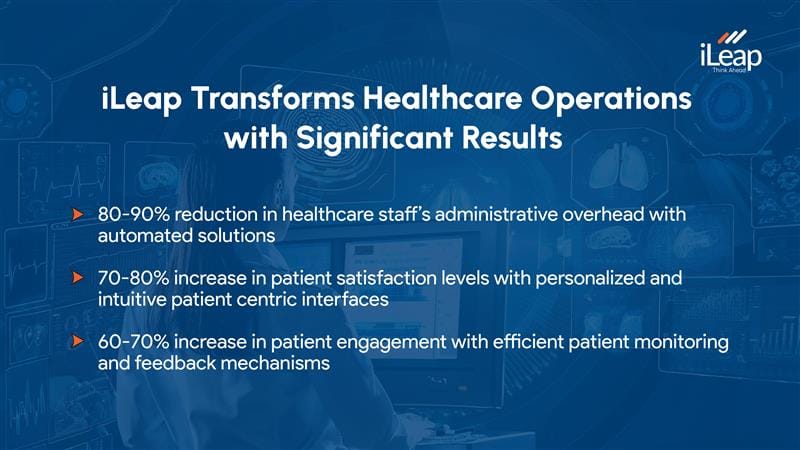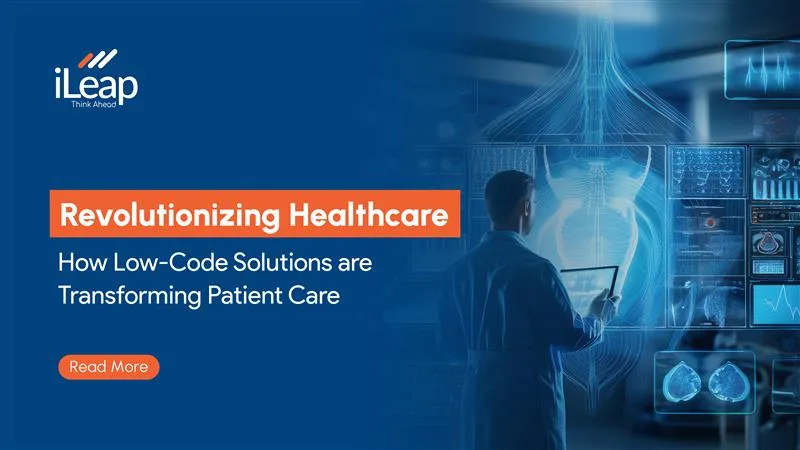Healthcare is an ever-evolving sector that must stay aligned with the latest technological advancements and regulatory needs. In today’s landscape, where patient satisfaction is paramount, challenges like inefficient processes, paperwork, or security concerns can hinder positive patient outcomes. Speed, transparency, and efficiency are critical for success. To drive healthcare digital transformation, many healthcare providers are adopting low-code application development platforms, accelerating innovation, and enhancing healthcare software solutions.
Low-code application development empowers both technical and non-technical users to actively contribute to digital health solutions. By simplifying internal and external processes, these solutions are transforming patient care and making healthcare more accessible and democratized.
Why are Low-code Platforms a Perfect Fit for Healthcare Services?
Low-code application development and healthcare are truly a “match made in heaven.” Most healthcare staff, including doctors and nurses, lack IT training, limiting their ability to leverage digital tools effectively. Low-code platforms bridge this gap by enabling quick and easy healthcare app development, even for non-technical users. These platforms offer faster, cost-effective solutions with scalable architectures and seamless integration with third-party software. By empowering healthcare professionals to engage in the development process, low-code ensures smoother workflows, improved patient care, and operational efficiency.
Low-code platforms like iLeap optimize workflows and boost financial performance through automated billing, budgeting, and resource management. Healthcare institutions leverage the power of low-code to automate tasks like appointment scheduling and reminders, reducing administrative burdens. The platform addresses challenges such as data storage, staffing shortages, technical debt, and regulatory compliance. iLeap makes collaboration between healthcare staff and IT professionals more efficient and effective.
How to Choose the Right Low-Code Application Development Platform for Healthcare?
Low-code is an agile development approach that enables building applications with minimal coding, making it easy to integrate with existing healthcare software. These platforms help healthcare providers streamline operations, reduce complexity, and deliver improved patient experiences. By modernizing processes through digital health solutions, healthcare organizations can achieve higher efficiency. However, selecting the right low-code platform requires careful research to ensure a successful digital transformation. The ideal platform should have the following features:
Intelligent Automation: Low-code application development enables intelligent automation of routine tasks, such as data entry and reporting. Automation eliminates redundant tasks, freeing up healthcare staff to focus on more important jobs like patient care. By leveraging advanced digital tools, these platforms enhance operational efficiency and support digital transformation for healthcare entities.
Seamless Integration: A robust low-code platform should seamlessly integrate with existing software and third-party applications. This ensures a unified workflow. By leveraging this feature healthcare providers can easily enhance their digital health solutions without disrupting current operations or requiring extensive IT resources.
Scalability and Flexibility: The chosen low-code platform must offer scalability and flexibility to accommodate new requirements. With effective healthcare app development, organizations can quickly scale and adapt to new regulations, technologies, and patient requirements while maintaining high-quality care and operational performance.
Customizable Features: Low-code platforms allow healthcare providers to trigger specific actions and adopt a flexible approach to internal and external operations. With the ability to automate emails, capture and retrieve patient records, schedule appointments, and allocate resources, solutions like iLeap enhance efficiency. Additionally, advanced notification systems support features like threshold management and escalation, ensuring timely responses to critical situations.
How Low-Code Solutions Enhance Patient Care?
Patient Registration and Records Management
With low-code application development platforms, healthcare organizations can build customized patient management applications that streamline processes like patient intake, appointment scheduling, second opinion services, and billing. This results in quicker admissions, allowing staff to focus more on patient interactions rather than administrative tasks. These new custom enhancements help patients experience reduced wait times and better services.
Automation of Appointment Reminders and Patient Surveys
In large healthcare chains, administrative tasks can be overwhelming. By automating appointment reminders and patient surveys, healthcare staff can concentrate on critical tasks that directly elevate patient care. Low-code solutions reduce this burden, leading to more efficient operations and enhanced patient engagement. This not only ensures patients don’t miss appointments but also provides timely feedback on their experiences.
Telehealth and Centralized Communication Tools
Legacy systems often lead to fragmented communication and delays. Low-code platforms simplify the development of telehealth solutions that incorporate features such as video consultations, secure messaging, and integrated electronic health records (EHR). Without these modern solutions, patients may face challenges in accessing timely care and long waiting times, especially in emergency situations. By leveraging digital health solutions, healthcare providers can offer more accessible and efficient care, improving patient outcomes.
Compliance and Accountability
By leveraging low-code solutions, healthcare services can ensure compliance specific to regional and international guidelines. Such compliances directly benefit patient care. By streamlining reporting processes for incidents and outcomes, these platforms enhance accountability and transparency within organizations. Security magazine also predicts that by 2030, businesses will be required to generate documentation on demand. For healthcare, it means more paperwork and manual documentation if they don’t move on from legacy systems to modernized low-code platforms. Improved compliance ensures that patients receive safe and high-quality care, as healthcare providers can track and respond to regulatory requirements at a faster pace.

Conclusion
Healthcare and low-code platforms align seamlessly, regardless of specific requirements, features, or regions. Industry-leading low-code platforms like iLeap empower healthcare providers to develop secure, cross-functional, and scalable applications tailored to their specific needs. This adaptability ensures organizations can drive healthcare digital transformation while improving both operational efficiency and patient care quality.
As a modern low-code digital automation platform, iLeap accelerates healthcare app development. It enables providers to quickly create solutions that meet evolving demands. From streamlining workflows to enhancing patient experiences, iLeap ensures healthcare software keeps pace with innovation.
Frequently Asked Questions
Q. How does modernizing legacy systems help healthcare organizations?
Modernizing legacy systems overcomes the limitations of outdated technology, improving efficiency and data flow without costly downtime. It extends the functionality of legacy healthcare systems and enables the creation of new, patient-focused apps.
Q. How does iLeap enhance patient experience?
iLeap empowers healthcare providers with intuitive, patient-centric apps, second-opinion services, and personalized communication tools. Its telehealth services ensure seamless, responsive care, improving patient engagement and satisfaction across various touchpoints.


